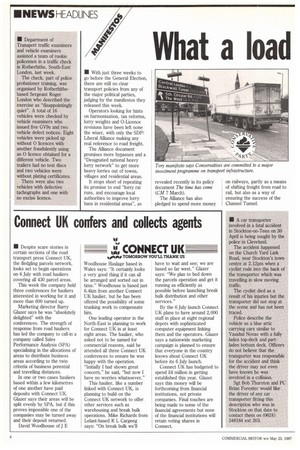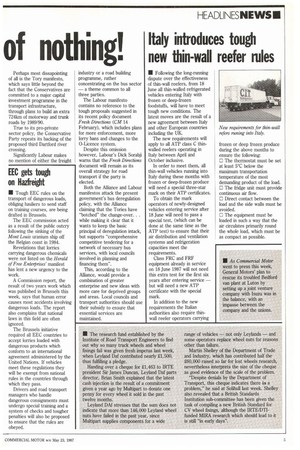What a load of nothing!
Page 6

Page 7

If you've noticed an error in this article please click here to report it so we can fix it.
• With just three weeks to go before the General Election, there are still no clear transport policies from any of the major political parties, judging by the manifestos they released this week.
Operators looking for hints on harmonisation, tax reforms, lorry weights and 0-Licence revisions have been left none the wiser, with only the SDP/ Liberal Alliance making any real reference to road freight.
The Alliance document promises more bypasses and a "Designated national heavy lorry network" to get more heavy lorries out of towns, villages and residential areas.
It stops short of repeating its promise to end "lorry rat runs, and encourage local authorities to improve lorry bans in residential areas", as revealed recently in its policy document The time has come (CM 7 March).
The Alliance has also pledged to spend more money on railways, partly as a means of shifting freight from road to rail, but also as a way of ensuring the success of the Channel Tunnel. Perhaps most dissapointing of all is the Tory manifesto, which says little beyond the fact that the Conservatives are committed to a major capital investment programme in the transport infrastructure, through plans to build an extra 724km of motorway and trunk roads by 1989/90.
True to its pro-private sector policy, the Conservative Party repeats its backing of the proposed third Dartford river crossing.
Significantly Labour makes no mention of either the freight
EEC gets 'tough on Harkeight
• Tough EEC rules on the transport of dangerous loads, obliging hauliers to send staff on training courses, are being drafted in Brussels.
The EEC commission acted as a result of the public outcry following the sinking of the Mont Louis uranium ship off the Belgian coast in 1984.
Revelations that lorries carrying dangerous chemicals were not listed on the Herald of Free Enterprises' manifest has lent a new urgency to the work.
A Commission report, the result of two years work which was published in Brussels this week, says that human error causes most accidents involving dangerous loads. The report also complains that national laws in this field are often ignored.
The Brussels initiative required all EEC countries to accept lorries loaded with dangerous products which conform to an international agreement administered by the United Nations. If vehicles meet these regulations they will be exempt from national rules in the countries through which they pass.
Drivers and road transport managers who handle dangerous consignments must undergo special training and a system of checks and tougher penalties will also be proposed to ensure that the rules are obeyed. industry or a road building programme, rather concentrating on the bus sector — a theme common to all three parties.
The Labour manifesto contains no reference to the tough proposals suggested in its recent policy document Fresh Directions (CM 14 February), which includes plans for more enforcement, more lorry bans and changes to the 0-Licence system.
Despite this omission however, Labour's Dick Sorabji warns that the Fresh Directions document will remain as its overall strategy for road transport if the party is elected.
Both the Alliance and Labour manifestos attack the present government's bus deregulation policy, with the Alliance claiming that the Tories have "botched" the change-over. . . while making it clear that it wants to keep the basic principal of deregulation intack, but supports "comprehensive competitive tendering for a network of necessary bus services, with local councils involved in planning and financing them".
This, according to the Alliance, would provide a combination of greater enterprise and new ideas with more care for deprived groups and areas. Local councils and transport authorities should use their subsidy to ensure that essential services are maintained.




























































































